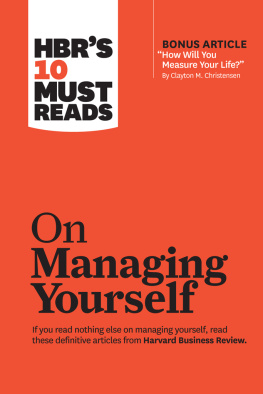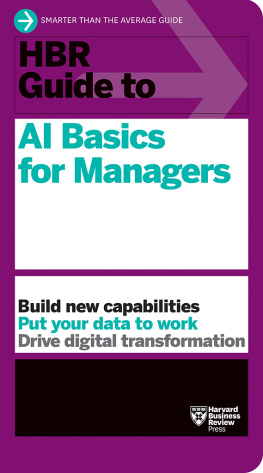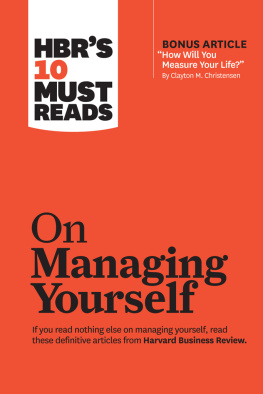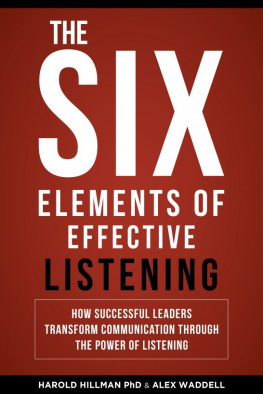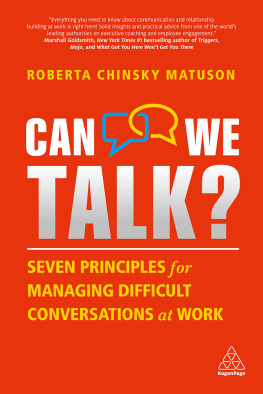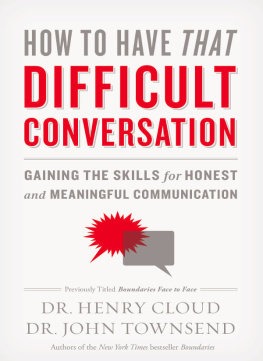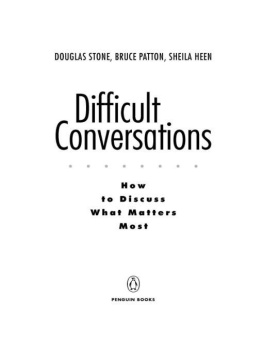Difficult Conversations
Difficult Conversations

Get up to speed fast on essential business skills. Whether youre looking for a crash course or a brief refresher, youll find just what you need in HBRs 20-Minute Manager seriesfoundational reading for ambitious professionals and aspiring executives. Each book is a concise, practical primer, so youll have time to brush up on a variety of key management topics.
Advice you can quickly read and apply, from the most trusted source in business.
Titles include:
Creating Business Plans
Delegating Work
Difficult Conversations
Finance Basics
Getting Work Done
Giving Effective Feedback
Innovative Teams
Managing Projects
Managing Time
Managing Up
Performance Reviews
Presentations
Running Meetings

Difficult Conversations
Craft a clear message
Manage emotions
Focus on a solution
HARVARD BUSINESS REVIEW PRESS
Boston, Massachusetts
HBR Press Quantity Sales Discounts
Harvard Business Review Press titles are available at significant quantity discounts when purchased in bulk for client gifts, sales promotions, and premiums. Special editions, including books with corporate logos, customized covers, and letters from the company or CEO printed in the front matter, as well as excerpts of existing books, can also be created in large quantities for special needs.
For details and discount information for both print and ebook formats, contact .
Copyright 2016 Harvard Business School Publishing Corporation
All rights reserved
Printed in the United States of America
10 9 8 7 6 5 4 3 2 1
No part of this publication may be reproduced, stored in or introduced into a retrieval system, or transmitted, in any form, or by any means (electronic, mechanical, photocopying, recording, or otherwise), without the prior permission of the publisher. Requests for permission should be directed to permissions@hbsp.harvard .edu, or mailed to Permissions, Harvard Business School Publishing, 60 Harvard Way, Boston, Massachusetts 02163.
The web addresses referenced in this book were live and correct at the time of the books publication but may be subject to change.
Cataloging-in-Publication data is forthcoming
ISBN: 978-1-63369-078-3
eISBN: 978-1-63369-079-0
Preview
Youve been putting off a difficult conversation. Maybe you feel wronged by someone or misunderstood. You may be caught in a clash of personalities or have competing goals with a colleague. Perhaps you have to deliver bad news, and you dread the persons reaction. Whatever your situation, you need to address an issue to keep moving forward. This book will help you develop the skills you need to turn a difficult conversation into a productive dialogue, including:
Understanding what makes some conversations difficult
Discovering whats at the heart of the challenge youre facing
Identifying and managing the emotions involved
Seeing the bigger picture to expand possible solutions
Framing the issue in a way your counterpart can relate to
Listening actively and responding with empathy
Staying flexible and managing the unexpected
Finding areas of agreement
Building on your new skills so youll be ready for the next tough conversation
Contents
What Makes a Conversation Difficult?
What Makes a Conversation Difficult?
You know the feeling: that knot in the pit of your stomach; the fog that descends on your mind. Youre avoiding a difficult conversation. Maybe you fear the public confrontation if you ask a colleague to stop interrupting you in meetings. Perhaps you dont know how to tell a fellow team member that shes not pulling her weight. Or you want to ask your boss for a promotion, but you dont know how to begin the discussion. Maybe you tried to bring up what you thought was a straightforward matter, but it fell flat. When you have a problem, people tell you to talk about it, but no one tells you how. This book will help you move from paralysis to productive action and find the right words and the right methods to express yourself.
At work we tend to focus on work: knocking off tasks, meeting our performance goals, getting a raise. But our inner livesour personal goals, needs, aspirations, and fearsinform and influence everything we do. Both our functional agendas (I need that production schedule by tomorrow!) and our emotional agendas (The production managers stonewalling made me look weak in the status meeting!) will sometimes collide with those of our coworkers. Misunderstandings, even conflicts, arise. Whether those disagreements throw us off balance and disrupt our work or lead to conversations that yield valuable insights and creative solutions is up to us.
A difficult conversation is one in which the other person has a viewpoint that differs from yours, one or both of you feel insecure in some way, and the stakes seem high. Whether you have tough feedback to deliver to an employee or colleague or whether you feel wronged, thwarted, or misunderstood by the other person, these situations can be unsettling, even if youre a pretty good communicator.
Understanding whats at the heart of your situation helps you conduct a more productive discussion. Lets look at some of the reasons why conversations are difficult.
Conflicting interests
Your role in the organization influences what you want to achieve in a situation. If, for example, youre a marketing manager on a major product update, your priority is probably hitting every rollout deadline. Your colleague in production, however, is focused on meeting design requirements. Of course, successfully delivering an important product requires meeting both quality and schedule specifications. But those differing interests will naturally cause conflict at times. You may find it tough to talk about them because each person quickly gets entrenched in their position (Weve got to improve call quality versus We have to cut costs by 5%). Sometimes interests also become misaligned when outside-the-office needs, such as family commitments or health issues, conflict with those at work. Developing an awareness of the factors that affect each persons approach to the project in question allows us to find ways to accommodate them.
Different personal styles
You think of yourself as a doera no-nonsense person who just gets the job done. No intrigue, no drama. Your teammate is a talker. He asks lots of questions, thinks things through aloud, considers the unintended consequences. Usually your different styles are able to coexistbut theres a deadline looming, and the project feels bogged down. How do you get him to move from exploring possibilities to picking an approach and closing the deal?
Working closely with someone whose communication or work style, personality, values, or life experiences differ greatly from yours has the potential to spark creativity and innovation, but it can also lead to misunderstanding and tension. What seems like a self-evident conclusion to one person may not have even occurred to another.
The more you understand about your own personal style, the more you will become aware of how your counterparts habits differ. , Example of different work styles, shows how understanding your own and your colleagues traits helps you work together effectively despite your differences.
Next page



